
Publisher:
Bonnie King
CONTACT:
Newsroom@Salem-news.com
Advertising:
Adsales@Salem-news.com

~Truth~
~Justice~
~Peace~
TJP
Jul-03-2010 10:07

 TweetFollow @OregonNews
TweetFollow @OregonNews
New York Times' Larry Rohter Rounds Venezuelan Coup Deaths up to 'Barely a Dozen'
Belen Fernandez Salem-News.comCommitment to prosperity and higher living standards was further called into question last year by the elderly Venezuelan street sweeper who refused to sell me her Chávez baseball cap.
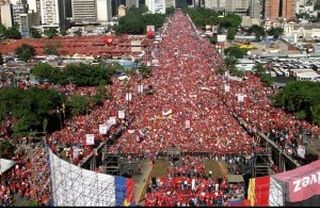 Chávez regularly doctors photographs in order to convince himself of popular mandate. |
(ISTANBUL) - In his recent review for The New York Times, Larry Rohter stages a valiant attempt to discredit the new Oliver Stone documentary “South of the Border”, which favorably portrays Latin American governments that enjoy considerable popular support. Among Rohter’s compelling evidence of the film’s “misinformation” is that Stone pronounces Hugo Chávez’ last name incorrectly.
As part of their rebuttal clearly proving that Rohter is the one peddling misinformation, Stone and the film’s screenwriters Tariq Ali and Mark Weisbrot detect a conflict of interest in the fact that the The New York Times review has been penned by the same author who wrote the following analysis after the 2002 coup d’état against Chávez:
"Neither the overthrow of Mr. Chavez, a former army colonel, nor of [Ecuadorian President] Mr. [Jamil] Mahuad two years ago can be classified as a conventional Latin American military coup. The armed forces did not actually take power on Thursday. It was the ousted president’s supporters who appear to have been responsible for deaths that numbered barely 12 rather than hundreds or thousands, and political rights and guarantees were restored rather than suspended.”
Further support for the concept of the nonmilitary-coup-nonetheless-conducted-by-the-military was provided by the U.S. State Department in the aftermath of the 2009 coup in Honduras and generated a lot of official stuttering during press briefings dedicated to conceptual explanation. Rohter appears to have limited his questioning of vocabulary accuracy in the Honduran context to a 1996 article in which he adds quotation marks to the term “sweatshops”; the appearance elsewhere on the Internet of a slightly different version of Rohter’s Venezuelan coup analysis cited above—with differences including the elimination of the term “Mr.” and the substitution of the words “a dozen” for “12”—meanwhile indicates that Rohter may now have even more ammunition with which to oppose the documentary’s factual basis.
Not clear, of course, is how the term “barely” factors into casualty counts, and whether Rohter’s twelfth casualty only died after being suckered in by pro-Chávez propaganda. Also not clear is why it is necessary to minimize deaths if you are blaming them on the enemy anyway, or why other mainstream news outlets reported that “[m]ore than 100 people died in events before and after the coup”, in addition to excluding the word “barely” from headlines like “Venezuela coup linked to Bush team.”
“Barely” is also excluded from the February 2009 The New York Times report on the Venezuelan referendum on abolishing term limits for public officials, which categorized Chávez as “decisively” winning despite Rohter’s 2002 decree that Chávez’ failure “to find a way to deliver the prosperity and higher living standards that he had promised… ultimately assured [his] downfall.” Commitment to prosperity and higher living standards was further called into question last year by the elderly Venezuelan street sweeper who refused to sell me her Chávez baseball cap.
Below are several of Amelia Opalinska’s photographs of our visit to Venezuela. Taken the day before the referendum, they feature barely a dozen Venezuelans oblivious to Chávez’ downfall.
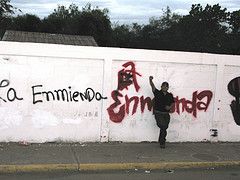 (Photo: Amelia Opalinska)
(Photo: Amelia Opalinska)
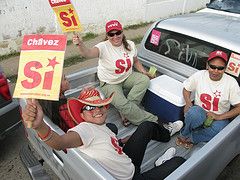 (Photo: Amelia Opalinska)
(Photo: Amelia Opalinska)
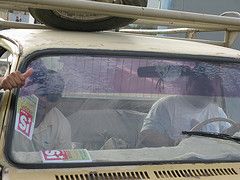 (Photo: Amelia Opalinska)
(Photo: Amelia Opalinska)
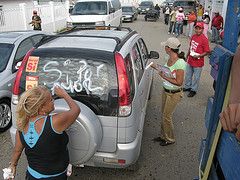 (Photo: Amelia Opalinska)
(Photo: Amelia Opalinska)
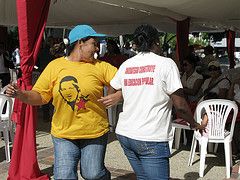 (Photo: Amelia Opalinska)
(Photo: Amelia Opalinska)
==========================================================
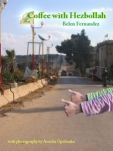
 Belén is a feature writer at Pulse Media. Her articles also have appeared in CounterPunch, Narco News, Palestine Chronicle, Palestine Think Tank, Rebelión, Tlaxcala, The Electronic Intifada, Upside Down World, and Venezuelanalysis.com. Her book “Coffee with Hezbollah,” a humorous political travelogue chronicling her hitchhiking trip through Lebanon in the aftermath of the 2006 Israeli assault, is available at Amazon, Amazon UK, and Barnes and Noble.
Belén is a feature writer at Pulse Media. Her articles also have appeared in CounterPunch, Narco News, Palestine Chronicle, Palestine Think Tank, Rebelión, Tlaxcala, The Electronic Intifada, Upside Down World, and Venezuelanalysis.com. Her book “Coffee with Hezbollah,” a humorous political travelogue chronicling her hitchhiking trip through Lebanon in the aftermath of the 2006 Israeli assault, is available at Amazon, Amazon UK, and Barnes and Noble.
Born in Washington, DC, in 1982, Belén earned her bachelor's degree with a concentration in political science from Columbia University in New York City. Her diverse background of worldwide experiences, created a fantastic writer; one whose work we are extremely happy to share with Salem-News.com viewers. You can contact Belén at: belengarciabernal@gmail.com
Articles for July 2, 2010 | Articles for July 3, 2010 | Articles for July 4, 2010

Quick Links
DINING
Willamette UniversityGoudy Commons Cafe
Dine on the Queen
Willamette Queen Sternwheeler
MUST SEE SALEM
Oregon Capitol ToursCapitol History Gateway
Willamette River Ride
Willamette Queen Sternwheeler
Historic Home Tours:
Deepwood Museum
The Bush House
Gaiety Hollow Garden
AUCTIONS - APPRAISALS
Auction Masters & AppraisalsCONSTRUCTION SERVICES
Roofing and ContractingSheridan, Ore.
ONLINE SHOPPING
Special Occasion DressesAdvertise with Salem-News
Contact:AdSales@Salem-News.com

Salem-News.com:
googlec507860f6901db00.html

Terms of Service | Privacy Policy
All comments and messages are approved by people and self promotional links or unacceptable comments are denied.
gp July 3, 2010 12:38 pm (Pacific time)
"The Revolution Will Not Be Televised" is a film about Hugo Chavez, elected president of Venezuela in 1998, and the U.S. supported coup that briefly took him from power. He is beloved by his nation's working class and a tough-as-nails, quixotic opponent to the power structure that would see him deposed. Two independent filmmakers were inside the presidential palace on April 11, 2002, when he was forcibly removed from office. They were also present 48 hours later when, remarkably, he returned to power amid cheering aides. Their film records what was probably history's shortest-lived coup d'?tat. It's about political muscle and an extraordinary portrait of the man The Wall Street Journal credits with making Venezuela "Washington?s biggest Latin American headache after the old standby, Cuba." Watch the documentary on the attempted coup: The Revolution Will Not Be Televised at this link:http://abcnews.go.com/WN/bp-oil-spill-birds-face-danger-migrate-gulf/story?id=11068341
[Return to Top]©2025 Salem-News.com. All opinions expressed in this article are those of the author and do not necessarily reflect those of Salem-News.com.